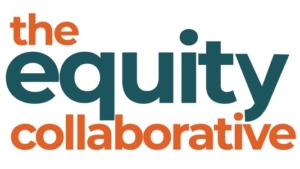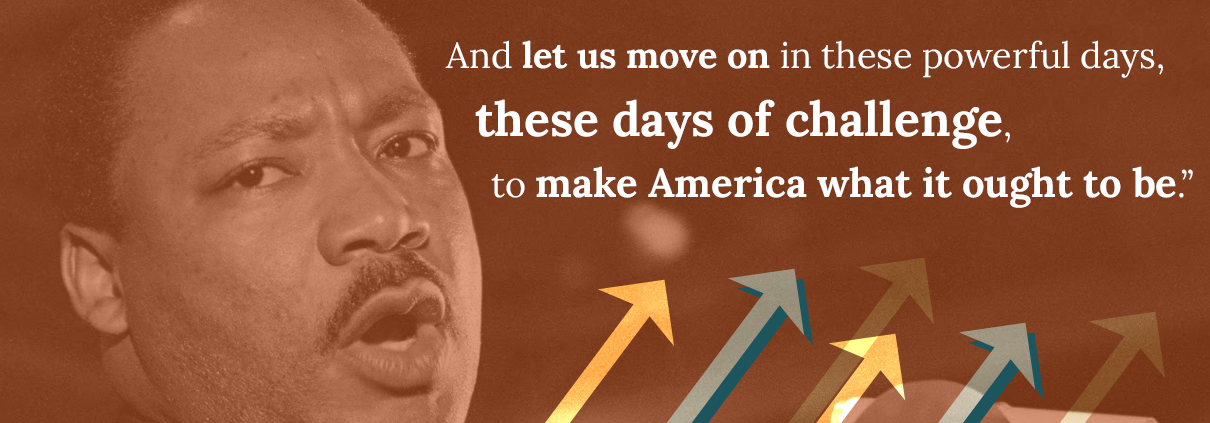The Profound Growth of Dr. Martin Luther King, Jr.
If the spectrum of human growth is what we most aspire to, why do we confine the memory of a man to one day…August 28, 1963? Dr. King was frozen in the steps of the Lincoln Memorial when I first met him. I was six years old at my mother’s dining room table looking at a picture of him and Ralph Abernathy. I was (as many others were) indoctrinated into my Blackness with his “I Have a Dream” message in my home, in school, and in society. The ideals of this speech had worked their way into our collective psyches as the axiom of freedom. Dr. King’s image on the steps of the Lincoln Memorial provoked visceral emotions that made one want to throw off the chains of chattel bondage and injustice and take up the mantle of freedom. Dr. King’s image was so ubiquitous that growing up, my friends and I joked that every Black household had a picture of Jesus and Dr. Martin Luther King, Jr. In my home, the two pictures were hung side-by-side as to symbolize some sort of asterisk of the holy trinity.
Now, as an older man, when I think of Dr. Martin Luther King, Jr., the first thing that comes to mind is growth. It is the dash, that inconsequential tool of the English language, between the years of 1929 and 1968, that is pregnant with an exemplar of human growth; from the time that he established himself as a philosophical, theological, and sociological scholar at Morehouse College to his public emergence as a leader in the Montgomery Bus Boycott and national social justice spokesperson. The dash represents the life of Dr. King.
The popular refrain of that consequential 1963 speech, the four words that have come to define Dr. King as a man and the call for civil rights as a movement, has become one of the most misunderstood, misconstrued, misrepresented, and hackneyed ideas of the 20th century. During that same 16-minute speech, Dr. King also called upon the people of this nation several times to “Let Freedom Ring.” Why not that refrain? Since dreams are not yet real, but the stinging realities of our past and present are, when re-listening to his extraordinary oratory, I wonder why a more apropos refrain to define the man as he progressed across his own spectrum of growth, wasn’t instead the phrase from the beginning: “…100 years later, and the Negro is still not free.”
My hypothesis is that the “I Have a Dream” narrative was lifted out of that speech because it was more aligned to the white supremacist’s revisionist history narrative, that America was already the home of the free. The dreamscapes that Dr. King so artistically designed for the nation were used to sidestep the reality of 1963, and the realities on the spectrum of time leading all the way up to the year 2021…100 years later…158 years later..and Black people are still not free.
The attempt to confine such a great man’s thinking and ideology to a single moment in time, a mere 16-minute speech, presents us with a great paradox. Although Dr. King’s 1963 speech has left an indelible mark on history, confining him to that day, to that thinking, is reductionism tantamount to not remembering him at all. We were not taught in schools to exalt the genesis and progression of Dr. King’s intellectual, social, and philosophical standings. Of more consequence to our understanding of Dr. King might have been his love affair with the work of Thoureau and his seminal text, On the Duty of Civil Disobedience. That philosophy is evident in Dr. King’s writings and in his approach for action against a white supremacist culture and politic.
Maybe we should consider the way that Dr. King ingeniously infused, in his own writings and actions, the works of Marx, Nietzsche, Locke, and Aristotle with social justice theology and seasoned it with the non-violent philosophy and actions of Mahatma Gandhi. We can even harken back to four months earlier in the spring of 1963, during the great struggle for desegregation and humane treatment of Black people that ensued in Birmingham, Alabama. Dr. King, in his famous Letter from a Birmingham Jail, stated, “We know through painful experience that freedom is never voluntarily given by the oppressor; it must be demanded by the oppressed.” Dr. King’s life, his philosophy, and his approach changed as he grew as a person.
Between 1963 and 1968, Dr. King successfully led and collaborated in several marches, boycotts, strikes, political victories, voting registrations, sing-ins, sit-ins; conversely, he endured arrests, attempts on his life and the lives of his wife and children, and major setbacks in the stride toward freedom. He marched on. He did all of this while adhering to his philosophy of non-violence.
Although the Montgomery Bus Boycott was a huge success, he subsequently supported more general calls to desegregate public spaces (e.g. Albany, GA, struggle in 1963). He would come to see the flaw in this strategy, and it morphed into targeting specific aspects of oppression and repression in Jim Crow. He spoke of revolution. He did not conceive of a revolution in the sense of a violent overthrow of the government, but a social movement that inspired both people and institutions to change (King, 1998). He stated, in what would be his final speech, “[I]n the human rights revolution, if something isn’t done and done in a hurry…to bring the colored peoples of the world out of their long years of poverty, out of their long years of hurt and neglect, the whole world is doomed.” Dr. King was murdered the next day.
Many have questioned why he was even in Memphis in the first place supporting a sanitation workers’ strike. Dr. King had already taken public stances against the war in Vietnam, he had been calling for financial independence and self-determination for Black people, and his overall ideology began to gravitate toward the center of the opposite ends of the spectrum that he and El Hajj Malik El-Shabazz (Malcolm X) had found themselves on. I think Dr. King would have responded to the reason he was in Memphis, as he most frequently did, that “injustice anywhere, is a threat to justice everywhere.”
In one segment of the speech, he said, “We are saying, we are determined to be men…we are determined to be people.” We are determined to be people. This is a not-so-subtle criticism of the treatment of Black people in America and the Constitution itself, referencing the sentiment of the 3/5ths Compromise enshrined within that classifies the enslaved as less than human. Law enforcement agencies, local police departments, state police departments, the CIA, and the FBI abided by the idea that Black people were less than human and treated them as such. As Dr. King’s criticism about this increased, so did the surveillance of him. It is well documented that J. Edgar Hoover and the FBI had targeted Dr. King and he was one of their most surveilled subjects. They knew that Dr. King was growing, changing, and becoming more critical about the United States and its hypocrisy.
Inevitably every January, a flurry of MLK quotes streams across the internet, social media platforms, and on television. What is often understudied, unrecognized, devalued, and misappropriated are Dr. King’s thoughts in his final day, his final hours, his final speech. His last speech resounded in the call of direct action to fight against oppression. He believed that there was no such thing as “outside agitators,” a phrase that we often heard during the summer of 2020 when opposers to justice referred to the protests by Black Lives Matter and other social justice-oriented organizations. He believed that we are all brethren that deserve the support of the drum majors for justice, wherever the drum may be beat.
In 1963, he declared “I Have a Dream,” and by 1968, he was actively working to make that dream come to fruition. It can be said that Dr. King was not killed for “I Have a Dream,” but for saying things in that last speech in Memphis such as, “Let us rise up tonight with a greater readiness. Let us stand with a greater determination. And let us move on in these powerful days, these days of challenge, to make America what it ought to be.” He was killed because he remained true to his word. He was killed for his growth. He was killed for trying to make America into what it said on paper…into what it ought to be.



